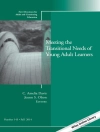Academic inbreeding – appointing one’s own graduates for academic positions – is a controversial but surprisingly common practice internationally. This book is the first comparative analysis of the phenomenon – the causes, implications, and future of inbreeding.
Tabla de materias
1. Academic Inbreeding: Local Challenge, Global Problem; Philip G. Altbach, Maria Yudkevich, and Laura E. Rumbley 2. Academic Inbreeding: State of the Literature; Olga Gorelova and Maria Yudkevich 3. Academic Inbreeding in the Argentine University: A Systemic and Organizational Analysis; Marcelo Rabossi 4. Faculty Inbreeding in China: Status, Causes and Results; Hong Shen, Zhiping Xu, and Bingbing Zhang 5. Inbreeding in Japanese Higher Education: Inching Towards Openness in a Globalized Context; Akiyoshi Yonezawa 6. Academic Immobility and Inbreeding in Russian Universities; Elizaveta Sivak and Maria Yudkevich 7. Slovenia: The Slow Decline of Academic Inbreeding; Manja Klemen?i? and Pavel Zgaga 8. Academic Inbreeding: The South African Case; Saleem Badat 9. Academic Inbreeding in Spanish Universities: Perverse Effects in a Global Context; José-Ginés Mora 10. Academic Inbreeding in Ukraine; Ilona Sologoub and Tom Coupé
Sobre el autor
Saleem Badat, Andrew W Melon Foundation, New York, USA Tom Coupé, Kyiv School of Economics, Ukraine Manja Klemen?i?, Harvard University, USA José-Ginés Mora, Institute of Education, University of London, UK Marcelo Alberto Rabossi, Torcuato Di Tella University, Argentina Hong Shen, Huazhong University of Science and Technology, China Elizaveta Sivak, National Research University Higher School of Economics, Russia Ilona Sologoub, Kyiv School of Economics, Ukraine Akiyoshi Yonezawa, Nagoya University, Japan Pavel Zgaga, University of Ljubljana, Slovenia












